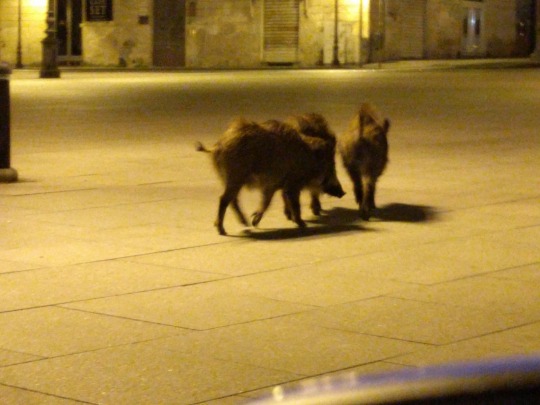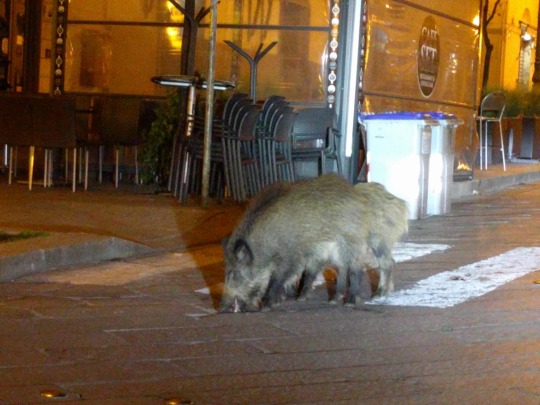learning: Spanish (B1), French (A2), Brazilian Portuguese (A2) I speak: German & English I post about: languages, study abroad & sometimes random stuff (sorry)
Don't wanna be here? Send us removal request.
Text
third day of italian quarantine: everything is closed, everyone is at home and so... WILD BOARS ARE IN MY TOWN WITH THEIR BABIES!!!! i’m laughing so hard


235K notes
·
View notes
Photo






Andrea & Leo Couture ‘Sequins’ Various Evening Collections
19K notes
·
View notes
Photo
i think i might try the monthly challenges. some of them sound quite fun.

1 Month 1 Language
1 Month Kanji Challenge
14 Day Langblr Challenge
30 Day Langblr Challenge
34 Hour Langblr Challenge
55 Days of Vocabulary Challenge
90 Day Vocab Challenge
100 Days Challenge For Langblrs
100 Hour 40 Day Language Challenge
A Question A Day Challenge
Build Your Vocab Challenge
Composition Challenge
Fiction Writing Challenge
Langblr Accent Tag
Langblr Culture Challenge
Langblr Music Challenge
Langblr Vocab List Challenge
Langblr Diary Challenge
Langblr News Challenge
Original Langblr Content Challenge
Linguistic Diversity Challenge
Indigenous Language Awareness Challenge
Vocabulary Challenge
SpeakingIn20 Langblr Challenge
A Book In Target Language Challenge
Brick-By-Brick Language Learning Challenge
Review Challenge
Subtitles Challenge
Summer Language Challenge
Translating Challenge
Challenges for certain months:
February Polyglot Challenge
March Polyglot Challenge
April Polyglot Challenge
May Polyglot Challenge
May Polyglot Challenge
August Polyglot Challenge
September Polyglot Challenge
September: 30 Day Langblr Resource Photo Challenge
October Polyglot Challenge
November Polyglot Challenge
December Polyglot Challenge
December Polyglot Challenge
10 Polyglot Things to Do This September
10 Polyglot Things to Do This October
Langblr NaNoWriMo
#polyglot#languages#languageblr#langblr#language blog#langspo#tongueblr#studyblr#challenge#language challenge#langblr challenge#masterpost
9K notes
·
View notes
Text
I am alive
I am sorry it’s been like a long while since I’ve been on here. I was kinda going through a tough time emotionally and mentally and you know...ended up spending the majority of my free time in bed watching useless youtube videos. Thankfully I managed to pull myself out of it yesterday and released that NOT doing anything in my free time is only making me feel worse. So I guess I am writing this so that I feel like I have committed to trying harder. I really need to reintegrate languages into my day to day life. Now that I am working a full-time job it’s a bit harder but I’ll find a way. My biggest struggle right now is that I am mixing everything because I moved from Brasil basically straight to Paris so my brain wants to answer in Portuguese every time someone speaks French and on top of that I have 3 other interns on my team right now that speak Spanish and the office language is English. So the terrifying conclusion: all my romance languages are deteriorating and slowly turning into one jumbled mess. HELP!
I’ll update soon with a plan on how I plan to integrate my languages into my everyday life (mostly French, and Spanish and Portuguese).
If you have any tips on how to fit languages into a busy schedule or about Paris let me know! Thanks
7 notes
·
View notes
Video
“The first time I hung out with her, Taylor made me homemade pancakes. I forgot about that moment until just now and they were like lowkey some of the best pancakes I’ve ever had in my entire life. They were so good. She loves cooking and she’s so good at it. And if she can’t figure it out, that same energy that she used to be like, ‘I’m gonna write a better album,’ if you’re like, ‘I want this,’ and she doesn’t know how to make it, she’s like, ‘I’m gonna look it up, I’m gonna get the ingredients, I’m gonna make it.’ It’s like she applies that mindset to everything in life.”
– Todrick Hall on Taylor’s cooking skills (Heat, February 6th 2020)
144 notes
·
View notes
Text
If only I spoke all the languages I own books for.
703 notes
·
View notes
Video
youtube
Why Finland And Denmark Are Happier Than The U.S.
6 notes
·
View notes
Text
the thing about “well-behaved women rarely make history" is that the author, Laurel Thatcher Ulrich, didn’t write it about women who would be considered “badly-behaved;“ she wrote it in a book about a midwife, about women who had been largely ignored and erased from history because as a result of their “good behaviour.” So it’s not a “BAD GIRLS DO IT WELL" kind of quote; it’s a reminder to respect and pay attention to the women who go about quietly living their lives.
137K notes
·
View notes
Text
Ok, but a funny aspect about speaking multiple languages is when you always have to have at least four online dictionaries open at the same time when you write a longer text because you know just the right phrase you wanna use but everytime it's in another language and also your brain blacks out and you forget what "gracias" means in english and oh, the phrase you wanna use now? It's perfect but there is no equivalent in the language you are writing in so you spend the next ten minutes on five different thesaurus sites in three different languages looking for an expression that is not even that relevant to what you're writing, oops, now you are looking for a word in a dictionary but you can't find it because it's the wrong language and you didn't even notice and now everything is burning.
Bonus points if the language you are writing in is actually your native language.
1K notes
·
View notes
Text
Brazil study abroad roundup
So since I failed at posting during my study abroad I am going to attempt to sum everything up here. I hope this might be helpful for people who want to study abroad in Brazil in the future.
Disclaimer: This is written based on my personal experience which is of course affected by who I am (20-year-old, female, Austrian, introverted, straight, white,...) and the people I happened to meet and a million other small factors.
If you have any specific questions don’t hesitate to inbox me or send me a message.
Rio de Janeiro
I spent my exchange semester in Brazil or more precisely in Rio de Janeiro. Rio de Janeiro is without a doubt a city unlike any other (I have ever seen at least). My favourite thing about Rio is its diversity in both its population and the landscape. Rio really has it all amazing beaches, lush-greenness and a buzzing city. The city itself was probably my favorite thing about my exchange. I remember the first day I arrived and drove through the city to get to my apartment. I was fascinated by how the rich and the poor lived so close to each other and how there were 15 story buildings right in front of green hills and corporate office next to a beach.
Culture and People
The culture is completely different from anything I have ever experienced before. People in Brazil are so friendly it is shocking. Everyone seems to be open to have a chat and help you out. The one downside I found to this (as an introvert) while everyone is open to having a chat it can be hard to find real, solid friends. People tend to talk about hanging out or doing something but as you are talking about it both of you already know that it will never happen. So while in general, I cannot complain about people since they are very friendly to foreigners I have not made any real friends.
Language
However, not making friends might also have something to do with the fact that my Portuguese wasn’t really good enough to speak much when I arrived here and most people don’t really speak English. While it has improved greatly (especially my understanding of native speakers) I am still missing the practice to come up with words quickly enough to have a fluent conversation. Also, slang is still an issue while I have learned some of it there seems to be an endless amount of slang terms that I will probably never know (the fact that Brazilian Portuguese slang changes quickly and varies by region isn’t helping either):
Food
I have a love-hate relationship with Brazilian food. There’s some food I really enjoy but then there is even more food that I don’t particularly like. The food that I did enjoy seemed to get too monotonous quickly. In general Brazilian cuisine tends to be very much meat-based (being a vegetarian is still somewhat rare here) with carbs also playing a big role. As someone who prefers to eat a bit more plant-based and lighter it was a bit difficult to imagine eating a typical Brazilian diet every day. But of course, this wasn’t really an issue I just bought my vegetables in the supermarket and prepared them the same way I would have at home. But I did miss typical dishes from home and also Maki with avocado or cucumber (for some reason they only have sushi with actual fish here).
Money
Brazil is not as cheap as some other Latin American countries, especially Rio is quite expensive. I would say on average the living expenses here are as much as in other European cities (not London or Paris). The prices for food are pretty moderate with imported goods, of course, being more expensive. The metro is cheap compared to European standards and while it does cover much less area than the underground systems in most other major cities it really does take you pretty much everywhere that you’ll need to go. Uber is also surprisingly cheap. If you can split the ride it might just end up being cheaper than the metro ticket. My monthly living expenses without trips and rent were around: €500.
Housing
The rent prices vary greatly depending on the area you live in, however, in general, the standard of living is lower so even if you pay €500 a month the apartment might have all the necessities but often just doesn’t look as pretty (not an issue just something to keep in mind). I personally chose to live in an apartment in Ipanema which I shared with another girl from my university we paid about €500/month each. When choosing an area to live in you should keep in mind that there are areas that are not so safe. Personally, we booked our apartment on Airbnb but many people find theirs on facebook or upon arrival.
Trips
I managed to go on quite a few trips but getting around Brazil can quickly get complicated and expensive since it is such a huge country. If you have a place you already know you would like to visit I recommend booking the airplane ticket as early as possible the closer you get to the date the more expensive they tend to get. The cheapest airplane ticket I managed to get was about €70 (one hour flight, no checked bags). There are buses almost everywhere and they can be significantly cheaper however it is debatable whether you would rather pay €60 and drive for 14 hours or pay €150 - 200 and fly for 2 to 3 hours. For shorther distances buses are of course completely fine and you can book most of them online or buy a ticket directly at the central bus station.
Personally, I visited:
Paraty Salvador Belo Horizonte Ouro Preto Buzios Blumenau Curitiba Porto Alegre São Paulo Petropolis
Education system
Like in many countries getting a good education in Brazil means getting a private education. Since my university had a contract with a private university that’s the kind of educational environment I experienced. Personally, education is a topic I feel quite passionate about or more specifically I feel quite passionate about the belief that education should be as accessible as possible to as many people as possible (I am not going to go in-depth here about why..). The Brazilian education system is built in a way that greatly advantages people who are more well off than the average Brazilian. I personally was not a fan of my university since I felt the entire thing was just this bubble that didn’t in any way mirror the Rio that I experienced outside of university.
Society
I touched upon this briefly in the previous section. One of the most interesting dynamics about Brazil is the society. There seems to be this strange dichotomy were Brazilians are proud of the diversity of their population yet there is some kind of deeply ingrained, probably to a large degree unconscious (like in many countries), racism going on. People who are noticeably darker in complexion are mostly still part of the poorest of the population while the richest look astonishingly European and nothing is done to change this. Brazilians are proud of their diversity yet the order of their society still reflects one of the colonial times. (I am in no way saying that every Brazilian supports the way things are. This is more a reflection of the politics going on in the country which are unfortunately corrupt to a large degree so we cannot exactly consolidate the current societal state with the actual opinion of people)
Touristy things + Leisure time
Now for a lighter topic. There is plenty to see in Rio and when I say plenty I mean a lot as in I didn’t even manage to see everything that I wanted to see. I plan to make a more comprehensive post on places to see in Rio (well-known ones and some not so well known). Leisure time is to a large degree spent outdoors on the beach, hiking, or at parties. One disadvantage of Rio is that it is a quite outdoorsy city so when it rains there aren’t many options for entertainment.
Party and dating culture
Parties here are a lot more spontaneous often happening on the street in front of university buildings. They are also a bit wilder it is quite common for one person to make out with several different people a night and it is almost unheard of that someone doesn’t drink alcohol. Dating culture from what I experienced (which is admittedly somewhat limited) is very relaxed. Casual relationships are extremely common and break-ups are usually quite pragmatic. At the same time, the macho culture is still a bit more prevalent than in many European countries. As someone who is introverted and doesn’t really enjoy casual relationships or just dating for the sake of dating it wasn’t my thing but each to their own.
Conclusion
Would I want to live here forever? No. Did I really like the experience? Yes. Brazil is what I like to refer to as an “extrovert country”. So as an introvert it can be quite exhausting to navigate the social life here even more so than in european countries since people here are very talkative and open. However, this was a thing I was prepared for and since it was a dream of mine to got to Brazil one day despite that I can’t say that I didn’t have a great time and that it wasn’t worth it. I definitely see myself coming back to see more of the country. I simply personally enjoy the openness for a short period of time but it would probably be too much for me to live like this for the rest of my life. I am also quite thankful to have been born in a european country with free education, pretty good public health care, less corruption and overall more stability. Still I would not ever tell anyone NOT to go to Brazil, or Rio especially. I like to think of Rio as the bad boy of cities. It might be a little dangerous or more uncomfortable than others but it’s just so pretty, fascinating and mysterious you can’t help but fall in love.
#BrazilExchange#study abroad#exchange student#semester abroad#Exchange Semester#travelling#brazil#travel#rio de janeiro#portuguese#university#student#study french#study languages
24 notes
·
View notes
Text
*feels both “I am so bored & understimulated I want to do EVERYTHING!” and “I am so exhausted & overwhelmed I can’t do ANYTHING” at the same time*
128K notes
·
View notes
Text
Degree programmes in English at my university in Austria
website of my university: https://www.fh-krems.ac.at/en/
Main selling points:
the only university in Austria to offer many of these programmes in English
international cohort: despite being a small university there are students from all over the world
internships are part of the curriculum most programmes give you a semester’s worth of credits for a 6 month internship
study abroad possibilities: there’s a semester reserved for studying abroad and many people do take the opportunity, the support is excelent
well situated: The university is situated in Krems, about an hour outside of the capital city Vienna. Krems is a student city.
personal: professors know you, most of your cohort will know you
low fees compared to international standards (about €380 per semester)
scroll down to find out more about the university and how it compares to others in Austria
If you have any questions feel free to send me an ask.

Disclaimer: This is a post I’ve been wanting to make for a long time just because I know how difficult it can be to find a university that suits you and I know that many of my followers are interested in traveling, living abroad, studying abroad etc. The post is not in any way sponsored or affiliated by my university I just really like my university and think some of you might be interested in it.
List of programmes offered in English
undergrad/bachelor: https://www.fh-krems.ac.at/en/study/bachelor/
Business:
business administration,
export-oriented management,
international wine business,
tourism and leisure management,
tourism and leisure management part-time
Digitalisation and Engineering:
applied chemistry,
informatics
Life Sciences:
Medical and Pharmaceutical Biotechnology
graduate/masters: https://www.fh-krems.ac.at/en/study/master/
Business:
International Business and Economic Diplomacy (currently in the process of being approved),
Marketing
Digitalisation and Engineering:
Digital Business Innovation and Transformation
Life Sciences:
Medical and Pharmaceutical Biotechnology
The university
In Austria, there are 2 kinds of universities: universities and universities of applied sciences.
My university FH IMC Krems is a university of applied sciences. Here is what differentiates universities of applied sciences form ‘normal’ universities.
quantity of students: university of applied sciences have smaller cohorts. My cohort consists of 70 people vs. hundreds of people in undergrad programmes.
This means that professors know you. You are not just a number. Most of my professors actually know my name. Also, it is much easier to find friends and get to know the rest of your cohort. My head of studies knows me. If I have an issue I can email him or even call him because he knows me he is more willing to find amicable solutions to any issues that might arise.
courses: universities of applied sciences have fixed schedules. Many people see that as a huge disadvantage since it takes away their freedom to choose courses however I see it as a huge advantage. Here’s why:
I have more or less a guarantee that I can finish my bachelor within 6 semesters. It can’t happen that I don’t get a spot in a lecture or class that I really wanted to get into. I can’t endlessly postpone my exams. It is easier to meet up for group projects etc. The cohort builds a kind of community and sense of belonging together after a while because you see more or less the same people every day.
exams: At university, the majority of exams take place at the end of the semester and your entire grade depends on one huge exam. In a university of applied sciences, there are often two exams a semester making up for your final grade or even presentations, team projects, papers etc.
quality: There are many people who say that universities of applied sciences offer a lower quality education than ‘normal’ universities. While there are some companies who prefer graduates of ‘normal’ universities there are also more and more companies who really value graduates from universities of applied sciences. Why? Because universities of applied sciences are focused more on real-life applications of theories rather than academy. There is a mandatory internship to be completed as part of the curriculum which means everyone who has graduated has at least one work experience (that is often much more valuable for an employer than someone knowing every detail of some theory). A lot of times lecturers are also professionals rather than just academics who have never practiced what they are teaching. Overall, whether you pick one or the other depends on your goals and/or personal beliefs.
student life: As mentioned before the cohorts tend to be more tightly knit than at a ‘normal’ university. Because the university is in a small town it is almost like everyone lives on a huge campus which makes it easy to hang out. While the city is small it is a city full of students since there are several other universities as well. There’s always something going on.
8 notes
·
View notes
Text
y’all ever just watch polyglot videos for motivation, but then spend all your time doing that so you don’t actually study any actual languages??? because same.
#langblr#studyblr#german langblr#french langblr#russian langblr#spanish langblr#portugese langblr#ukrainian lanblr#language learning#dark academia#english langblr#korean langblr#mandarin langblr#japanese langblr#italian langblr#sombrestudystudies
784 notes
·
View notes
Text
Language learning listening&speaking tip!
I have only recently heard about this method to improve your listening comprehension alongside your speaking skills. It’s called shadowing.
The concept is that you listen to your target language recording whether it be radio, samples, a podcast… And you repeat immediately. Without stopping, simultaneously, as if you were an interpreter and had to belt out a translation right away.
This helps you to truly sharpen your hearing skills since you have to say everything immediately afterwards. If you find it too had at first, try listening with a transcript.
#language learning#studyblr#langblr#languages#polyglot#multilingual#listening comprehension#speaking tips#language
1K notes
·
View notes
Text
“After learning my flight was detained 4 hours, I heard the announcement: if anyone in the vicinity of gate 4-A understands any Arabic, please come to the gate immediately. Well—one pauses these days. Gate 4-A was my own gate. I went there. An older woman in full traditional Palestinian dress, just like my grandma wore, was crumpled to the floor, wailing loudly. Help, said the flight service person. Talk to her. What is her problem? We told her the flight was going to be four hours late and she did this. I put my arm around her and spoke to her haltingly. Shu dow-a, shu-biduck habibti, stani stani schway, min fadlick, sho bit se-wee? The minute she heard any words she knew—however poorly used—she stopped crying. She thought our flight had been canceled entirely. She needed to be in El Paso for some major medical treatment the following day. I said no, no, we’re fine, you’ll get there, just late. Who is picking you up? Let’s call him and tell him. We called her son and I spoke with him in English. I told him I would stay with his mother until we got on the plane and would ride next to her—Southwest. She talked to him. Then we called her other sons just for the fun of it. Then we called my dad and he and she spoke for a while in Arabic and found out, of course, they had ten shared friends. Then I thought just for the heck of it why not call some Palestinian poets I know and let them chat with her. This all took up about 2 hours. She was laughing a lot by then. Telling about her life. Answering questions. She had pulled a sack of homemade mamool cookies—little powdered sugar crumbly mounds stuffed with dates and nuts—out of her bag—and was offering them to all the women at the gate. To my amazement, not a single woman declined one. It was like a sacrament. The traveler from Argentina, the traveler from California, the lovely woman from Laredo—we were all covered with the same powdered sugar. And smiling. There are no better cookies. And then the airline broke out the free beverages from huge coolers—non-alcoholic—and the two little girls from our flight, one African American, one Mexican American—ran around serving us all apple juice and lemonade, and they were covered with powdered sugar, too. And I noticed my new best friend—by now we were holding hands—had a potted plant poking out of her bag, some medicinal thing with green furry leaves. Such an old country traveling tradition. Always carry a plant. Always stay rooted to somewhere. And I looked around that gate of late and weary ones and thought, this is the world I want to live in. The shared world. Not a single person in this gate—once the crying of confusion stopped—has seemed apprehensive about any other person. They took the cookies. I wanted to hug all those other women, too. This can still happen anywhere. Not everything is lost.”
— Naomi Shihab Nye (b. 1952), “Wandering Around an Albuquerque Airport Terminal.”
530K notes
·
View notes

